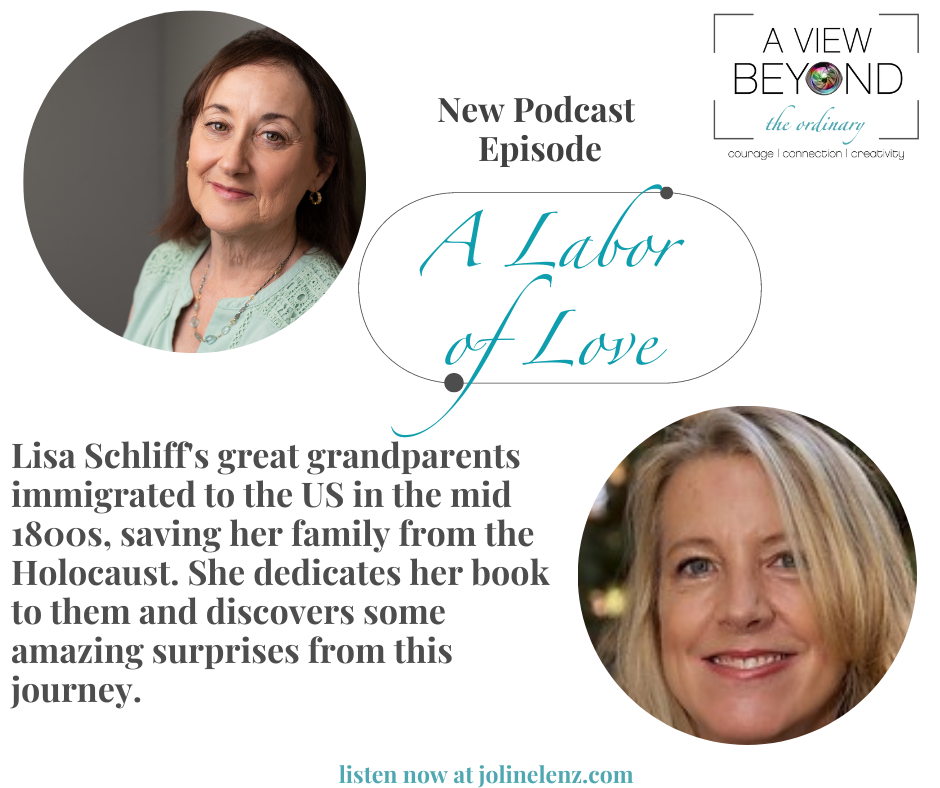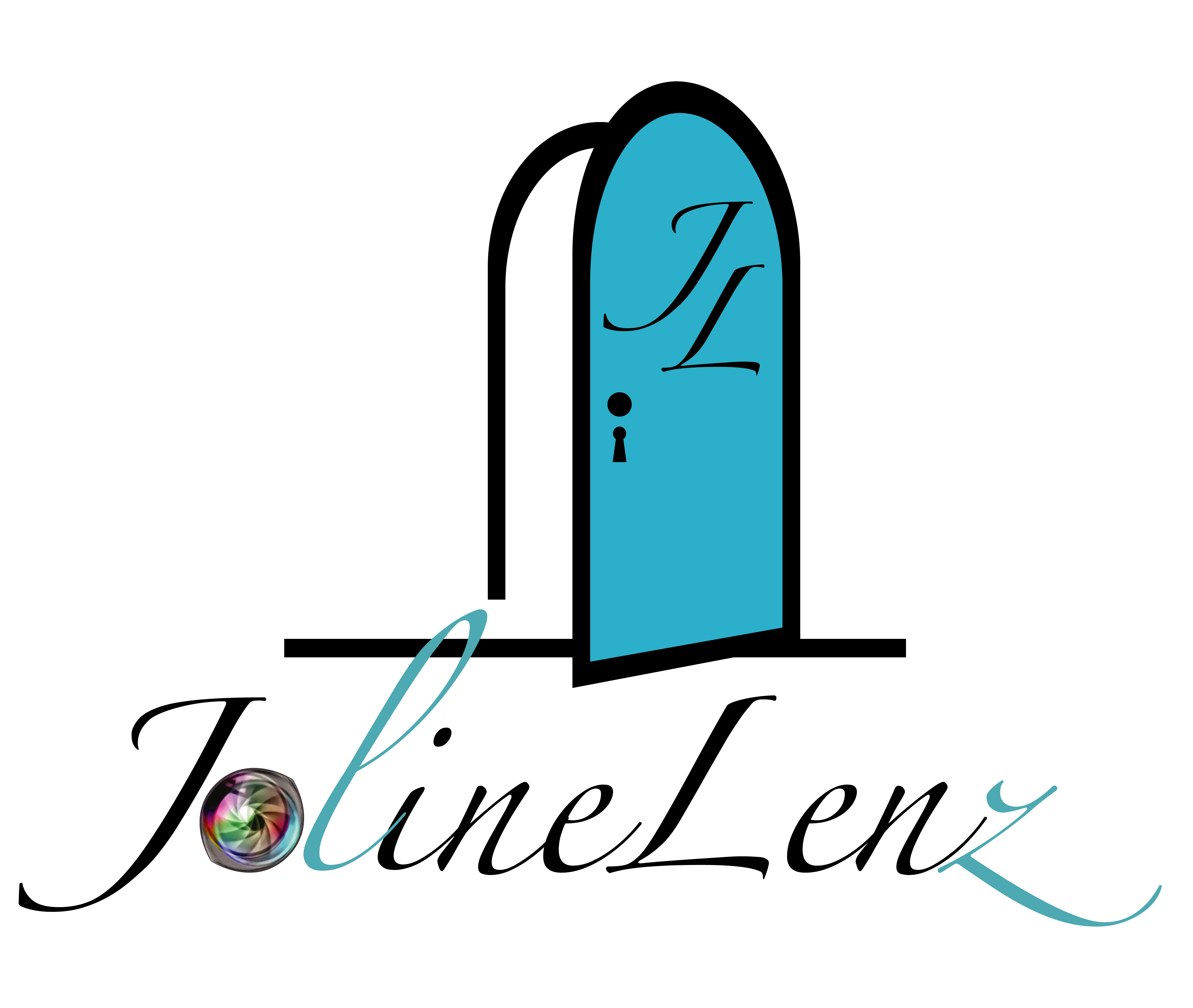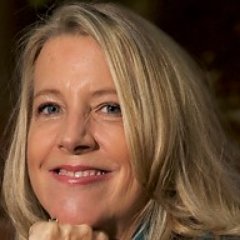
Labor of Love

Our podcast guest, Lisa Schliff, dedicates her first book, Fire in the Springs, to her great grandparents. Unknowingly they saved her family from the Holocaust. She shares what compelled her to write this story and what she learns about Judaism ethos, culture and more. She uncovers some surprising twists that were revealed and offers tips to publishing a book. For all of you aspiring dreamers or writers who have a story or dream to pursue, Lisa’s labor of love endeavor may inspire you to take those steps toward pursuing your goal.
Our podcast guest, Lisa Schliff’s contact information: https://lisaschliff.com/
A Fire in the Springs Review:
Lisa Schliff’s first novel, Fire in the Springs, is an excellent example of the historical fiction genre. The novel demonstrates the author’s command of story telling as well as her language skills. Ms. Schliff deftly uses some clues that she had gathered about her great-grandparents’ immigration saga to the US from Germany in the mid 19th century to weave a plot that engages the reader from the beginning of the book to the end. Fire in the Springs is a page turner, full of interesting and well developed characters from a variety of cultures. The reader is treated to a detailed description both of the small towns in Germany where the main characters lived in the early part of their lives, and the small Southern town to which they moved to start anew.
“I will not allow my life’s light to be determined by the darkness around me.”~ Sojourner Truth
Podcast Transcription:
Joline: Thank you for joining us today at A View Beyond the Ordinary. I’m your host, Joline Lenz. I interview some courageous souls who share their extraordinary story with the goal of helping us pursue our bliss. Let’s get started and tune in.
Joline: I’m thrilled you all are here to join Lisa Schliff, my guest, on the podcast today. And as we get started, I’d love to find out, first and foremost, Lisa, if you could share a little bit with the audience about you. Tell us a bit about yourself.
Lisa: I grew up in Los Angeles and I attended college at UC Santa Barbara, got a bachelor’s degree in Spanish, and I spent my senior year in Barcelona, Spain. So, I am conversational in Spanish, and it’s come in wonderfully in my life. I have a master’s degree in English with an emphasis on ESL. I’m a retired now ESL teacher, and I have always loved working with immigrants. And writing this novel about immigrants was really, for me, a natural. Lisa: I’m married 43 years to my husband, Steve, and we have two children, adult children, Rebecca, who lives in Chicago, and Adam, who lives in Lodi and teaches there. And I’ve been writing all of my life poems, short stories, but never seriously anything to publish until the past 10 to 15 years.
Joline: I am so appreciative that you were here. And just for everybody I know, Lisa. Lisa and I met at a writers’ group, gosh, it’s been probably six years ago, at least. So, I had the opportunity to meet Lisa in California when I lived there and knew that she was writing this book. And I’m really excited, Lisa, to learn more about the book. So just for all of you out there, just so you know, the name of the book that Lisa has written, it is called “Fire in the Springs,” and she recently published it. And first and foremost, I want to find out from you what called you to feel led to write this particular story.
Lisa: Well, it’s interesting. The writing evolved out of researching my great grandparents. They were the immigrants that brought us to America, that saved us completely from the Holocaust. We were all here in America when that happened. We are Jews, and the town that they came from was really invaded by Nazis, and everyone there was killed, so we wouldn’t have survived. So, I really did this out of an honor to my great grandparents. But I started out thinking I’ll write a little family biography for my living cousins, and I couldn’t really find out much about them. They did not leave anything behind, no letters, no journals, no diaries. I did have some stories they did immigrate. My great grandfather immigrated in 1859, my great grandmother in 1866 or 65, and they got married in 67. And I thought, well, this went on with the Civil War in between. What did they see? What did they do? I had so many questions. Did they know each other before they got married? Was it arranged blind marriage? They were Orthodox Jews. Could have gone either way. And my mother told me some stories about my great grandmother that intrigued me. She was only four foot eight. She had eight children. As it turns out, she did not have eight children. But that later, I’ll tell you that. She swore like a sailor so badly, my mother tells me, that the children were not allowed to play with her in the neighborhood. Parents didn’t want them near her grandmother. She was mean tempered. She favored the boy over the girl, that would be my mother’s brother. And so, I used all that to color the novel. What happened was I got to a point where I realized I would either have to leave it or write a fiction about it, filling in my answers, because anyone that might have information for me had already died. And my cousins didn’t know any more than I did. I asked them. So, this is why I got called to write. The novel was as an homage to them and also just to fill in the blanks for myself based on the historical backdrop. So really, this novel is a fiction based on fact.
Joline: Basically, Lisa, it sounds like in this story, what a gift to write about your family and leave this as well for your kids. And it sounds like you filled in the gaps. And it is not all obviously factual, it’s more of a fictional historical. And if I looked, I think I looked at a review, it sounds like it’s a bit of a romance. Is that correct?
Lisa: Yes, it is. My great grandparents had ten children, and so obviously their marriage worked on some level. And so, I decided that there was going to be chemistry between them. You just don’t know unless they leave behind writing. And to make it a fun, readable, provocative novel, I built up the chemistry and made it romantic and put obstacles in their paths that they had to overcome to marry each other.
Joline: So, it sounds like you had quite fun writing about this. And I was going to say, in terms of just being able to find out information about your grandparents, great grandparents, and what you were able to uncover, were there any surprises that you learned about your family?
Lisa: Definitely there were. The first one being I discovered through the US. Census that my great grandmother had ten children, not eight. My grandmother, who lived upstairs, she that would be her mother’s mother. Her mother told me there were always told me there were eight of us. She was the youngest. There were four girls and four boys, but in fact, there were ten, and two of them must have died young. I did see one of their graves, Nathan, who died at two, and apparently they did not share that information with their children, or their children did not talk about that. That was one of the surprises. Another surprise was that I actually channeled my great grandmother when I started writing. And what happened was I couldn’t decide if the trees that I was describing in front of their house were going to be peaches or apple trees. And I thought, well, it’s the South. I’ll make them peach trees. And all of a sudden, I felt this presence right at my side, and I heard in my head, “they were apple trees,” and that did not come from me. And when I shared that with other writers, they shared back that, yes, they had had these channeling experiences, too, with ancestors, the writers that were writing about them. So that was quite a surprise.
Joline: I’ve had that happen myself. So, I know what that feels like when you go, I know I didn’t conjure this up. This came from something else. So, the fact that you had some support, it sounds like, in writing the book from your great grandmother and probably great grandfather, was there any other just interesting little tidbits that came out of what you didn’t know about your family history, too?
Lisa: Not too much about my personal family history because, as I said, there was very little. And I concluded that was because the Civil War and the chaos of the Civil War interfered with a lot of records, and the county courthouse burned down in 1903. That was a surprise. So, I couldn’t access a lot of their documents. But I learned in terms of historical surprises that there was sex trafficking going on the steamships that carried immigrants from Europe to America. And I wrote that into the novel, and I also learned about the New Orleans Black Massacre of 1866. It was an attack on Black state politicians. It was a voter suppression attack. It was quite violent that went into the novel. So that was I had never heard of that, and most people I’ve talked to have not heard of that.
Joline: So, this sounds like it was pretty educational. I mean, not only you learned a great deal about history during that time frame, and you also, if I’m not mistaken, didn’t you tell me your family, they moved to Arkansas, correct?
Lisa: Well, that’s where they settled. My great grandparents settled in Hot Springs, Arkansas. Then their youngest daughter, my grandmother, Teeny, moved to Alabama with her husband. And then as a widow, she moved her children here to California, which is where I grew up.
Joline: Can you imagine coming over and then immediately going down into Arkansas and then Alabama? Just Southern traditions, Jewish family, and the fact that you mentioned escaping the Holocaust. Lisa, first, my heart goes out to all of those impacted by what happened over there. What an amazing story. I mean, they basically saved all of you.
Lisa: That is correct. And in fact, here’s another surprise. When I visited Hot Springs, I actually flew there and visited for a week and researched there. I found there was a Jewish cemetery. It was an old cemetery. And I saw the headstones and the graves of these people in my novel, my great grandmother and great grandfather, I took photos, I left a stone on their graves. That’s a Jewish tradition. And that’s where I saw the little grave of Nathan, the two year old.
Joline: Oh, wow. How long did it take you, Lisa, to write this?
Lisa: I’m going to say ten plus years.
Joline: So, it has been a work, a love project that you have been working on for a while.
Lisa: Yes, it has. It’s been a while. And there were times when I stopped and thought, what am I doing here? I don’t know how to write a novel. And those were things that I had to push through, right? Keep going and just keep going, really, for the joy and fun and the learning of it and the stimulation.
Joline: Well, congratulations on accomplishing it. How many of us have a dream? And just the ability to fulfill that and see that through is such an amazing feat. What do you think was your most challenging obstacle that you ran across writing this book?
Lisa: Well, in writing the book itself, I would say developing the plot and subplot, I found that to be quite an obstacle because I had never done that before. It’s way more complex than the little poems and short stories I wrote. And I took workshops, seminars, I went to conferences, spoke with other writers, and had to learn how to develop plot. So that was one obstacle that I had to overcome, was how was I going to think up a plot? And I did.
Joline: Incredible. And who are the main characters? Is it your great grandmother, then, and great grandfather? And what are their names?
Lisa: That’s correct. My great grandfather was Carl and my great grandmother was Rosalia Wilson. Those were the two main characters. I also added a fictional brother to Carl named Samuel. The name Samuel appears on my family tree, so I just used that. And his wife Gussy, who Gussy, also appears on her family tree. So, I developed those two characters as well, because generally Jewish people immigrating over to America, went to where relatives already were.
Joline: Okay. So, the joy of being able to add to the story. And I’m excited to go get the book. Lisa, I’m going to have one more book I need to add to my list of reading. But fascinating that you found a Jewish cemetery in Arkansas.
Lisa: Yes, it is. And the reason I didn’t stumble across it, the reason I found it was because I went to the Jewish synagogue, met with the rabbi, and talked to him about my novel and about my relatives, who in fact, I found some plaques of relatives on the wall of the synagogue. And then he said to me, “Have you visited the Jewish cemetery yet?” And I said, “I didn’t even know there was one.” So, he gave me the address, and off I went.
Joline: And on that note, in terms of just Jewish customs that perhaps have been passed down for you, what are some of your core customs that you’ve kept from your family?
Lisa: Well, I have to admit, not many, because my mother and father both rejected the religion of Judaism. They did raise us cultural Jews, that was very common in their generation to reject the religion and to call themselves cultural Jews. But one of the main customs that I kept was matzo ball soup for Passover. So, we always have that. And we did recognize Passover, lighting the candles at Hanukkah. There’s eight candles and a ninth candle to wipe the other eight. So, I knew about that, but really not a whole lot more. I actually joined a reformed temple and immersed myself in Judaism before I ever wrote the novel or even thought of it. And I learned about the Jewish religion that way.
Joline: You’ve kept a few of those things, but I’m sure you’ll probably expand maybe some more now that now that you are part of that. Has it changed your thought process of Judaism?
Lisa: Very much so. It’s a beautiful religion. And of course, any religion can be misused, and people who are following it can misbehave. But I’ve learned that that’s not how to judge a religion and that there are symbols, there are concepts. If those are for you, grab you, they give you a moral compass, they give you support and an anchor, then use them that way. And that’s what I do. And it just enriches my life. I love going to temple. My parents hated it, so I’m just not them.
Joline: Oh, I’m so happy to hear that you found joy in doing that. That’s great, Lisa. And I know that you self-publish the book. Can you here a little bit? What led you to want to do that?
Lisa: Well, yes, self-published, and we call it independent publishing now, because self-publishing is a term that the big publishing houses used in a kind of a put down manner. You weren’t good enough. But the publishing industry has changed quite a bit. I spent four months, and I gave myself four months, a deadline of four months to find an agent and or a publishing company. And I could not. They were really looking for people who were celebrities. They’re looking for people who have already published successfully or people with huge social media followings. I did not fall into any of those categories. And so, after four months, although I got a couple of offers, they were publishing companies that wanted to change the book dramatically. One of them insisted that I get rid of my great grandfather’s character before they would publish it. He was so enchanted with Rosalia, he wanted nothing to do with Carl. And I thought, no way am I going to do that. So, I decided to independently publish the book. And I was very happy. And what I learned in that process was it only takes a matter of weeks or maybe a few months for you to get your book out on Amazon and your book out for sale and to have a paperback book in your hand. But publishers are going to take you anywhere from three to five years. And I didn’t have that time, and I’m pleased with my own choice.
Joline: Well, again, huge congratulations. It does take some effort. I am published on Amazon as well, and I know it’s a process, so good for you, Lisa, that you did that. And is there any recommendation for those aspiring writers out there that may have a storyline, story idea, and obviously, your story, you were able to get it done? What advice would you impart to those individuals?
Lisa: Yes. I would say keep learning your craft, take workshops, go to lectures, join writing organizations, and you will then enrich your writing beyond your best abilities and dreams. It will go way beyond if you keep putting in and keep writing, even if you feel insecure about it, because the more you write, the better you get, just like with anything else. Also, I would say dream big and imagine you’ve already written the book and imagine it’s already been published. Imagine it as a best seller, and just keep pointing yourself in that direction, but be flexible.
Joline: Thank you, Lisa, for imparting that, too. If we’re not having fun in the process, what is the point? But it was probably, again, a labor of love for you. Now that you have this story complete, I was going to say, did you publish it late last year?
Lisa: Published it in October of 2022.
Joline: Great. And what a beautiful gift, again, to your family and to all of you listeners out there. I will share Lisa’s information in the show notes so that we can all reach out and check out her book on Amazon. I read some of the reviews, Lisa, and they’re amazing, so I’m excited to get it. I will definitely be doing that soon. And thank you so much for coming to join us today at A View Beyond the Ordinary.
Lisa: Well, thank you for having me, Joline. It has been a pleasure and I love working with you and thank you for allowing me to share my writing experience with the crowd.
Joline: Well, you know what, it takes courage to pursue a dream and that’s what this platform is about. So, I am just delighted that you did that. So for all of us out there, I think what Lisa said just to ring, rings true to me, which is just get started. And even though it may not feel like we’re experts at it, continue. Things do develop. All of you, thank you so much for tuning in today. We greatly appreciate it and may you be blessed. Cheers, everybody.
Joline: Thank you all for joining us in this journey today. We are so grateful that you’re here and if you would like to connect to one of the guests, I always share their information in the show notes on my website, which is jolinelenz.com. And don’t forget to also subscribe to the podcast. I’d certainly appreciate that, and I’m wishing you all much joy and fulfillment in your path ahead. Cheers everybody.
Lisa Schliff’s contact information: https://lisaschliff.com/





